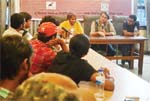 The much talked about Indian film Children of War has yet again found itself amid controversy as local film activists, journalists and intellectuals voiced their criticism about the film.
The much talked about Indian film Children of War has yet again found itself amid controversy as local film activists, journalists and intellectuals voiced their criticism about the film.
The criticising remarks came at a roundtable discussion that was organised by Movieyana Film Society at the Munier Chowdhury Hall of TSC on Monday afternoon. Directed by Mrityunjay Devvrat, the Children of War: Nine Months to Freedom stars popular Indian actors like Raima Sen, Indraneil Sengupta, Victor Banerjee, Pawan Malhotra, Tilottama Shome, newcomers Rucha and Shatrunjay and the late renowned actor Farooque Sheikh.
The film, through focusing on different situations of the war inflicted country in 1971, reveals the ordeal of people, particularly women who were subjected to unimaginable injustice and violence. Revolving around Bangladesh’s fight for freedom, the film shows how Pakistani soldiers used rape as a weapon to demoralise their opponents. Raima Sen and Tillotama Shome have played the female leads in Children of War.
Noted writer professor Salimullah Khan, noted journalist Fareque Wasif, film critiques Fahmidul Haque and Zahid Aziz, film researcher Sabrina Sultana Chowdhury, Shahidul Islam Khokhon, president of Bangladesh Film Directors’ Association, and others spoke at the discussion session that was presided over by Belayet Hossain Mamun, president of Movieyana Film Society.
At the discussion session, the speakers observed that the film is full of mistakes in terms of facts and figures. For example, the film used ‘Dhaka’ to refer to the capital of Bangladesh even though in 1971 the city was known as Dacca.
The speakers also shared that these mistakes reveal the fact that the director and script writer did not conduct adequate research on the country during war.
Besides, the speakers also added that the film might have depicted history but it completely failed to portray emotions of the Bengali nation regarding the war. The film has presented the war as a fantasy rather than depicting the real emotional and psychological journey that the freedom fighters and the victims underwent.
Some of the discussants also observed that the way the film portrays the war, it seems that the Indian army actually fought the war while the freedom fighters were only associates. Therefore, the film illustrated Indian contributions in an exaggerated manner and undermined the contribution of Bengali freedom fighters.
The speakers also shared their disappointment over how the Censor Board of the country granted the film to be released in Bangladesh.
-With New Age input




















